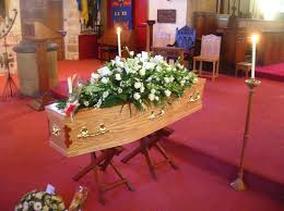
For one thing death was hardly mentioned. Of course sympathy was offered to the family and sorrow was expressed at the person's passing but there was no real attempt to make sense of death or what it might mean. It's often said that death has become the taboo subject of our culture, so much so that there was an attempt to initiate a national conversation about it here in Scotland a number of years ago. Many people today have never seen a dead body, been to a wake or an internment. Death has become something private, to be hidden away and it feels as though some Christian denominations are colluding in this. I've heard people say it's easier for the family to have their grieving in private which allows them to be more composed during the public service. But why should we be afraid to show grief in public? Are grief and tears not an expression of a love that lasts beyond the grave? Bereavement is one of the most painful experiences there is but it's also one of the most human and perhaps we should be giving those who mourn permission to express it openly. Some cultures are better at doing this than those like our own that feel it's important to show a stiff upper lip.
All religions believe that death is not the end but a transition to a new way of being, though they don't agree what that might be. They see funerals as a rite of passage, an expression of sorrow and farewell, a way of supporting someone as they let go of life and move on to whatever comes next. For me the funeral of a friend with whom I have talked about life and death is such an opportunity and not to be able to do this because the actual funeral has taken place privately is a loss. I feel I haven't somehow shared this moment with them. While it's good to honour the person's life, it's also important to me to participate in this rite of passage and to bid them farewell in a context of such a rite of passage. I'm not sure if it's true at present but at one time the Catholic Church forbade eulogies at a requiem mass and while I wouldn't go this far I do understand the sentiment.
It also strikes me that while close family are naturally the ones who are most bereaved none of us simply belong to our family but to a much wider network of contacts and relationships, many of which will be unknown to our family. Many of these contacts will have their own private memories and be affected by the death and I'm sure, like me, would want to participate in the funeral.
Where else is death to be acknowledged and talked about if not in a religious funeral? Death is perhaps the last and greatest mystery of all. But no matter what our faith teaches about it, it's important to integrate it into life and not be afraid of it. Some cultures say that we only really live once we have faced the reality of death and funerals can help us do this. It's good too to remember that our life is greater than our life span. Each of us is part of a story much greater than our individual lives, greater than our work or achievements. Our life story includes the effect and influence we have on the many people who come into contact with us. It will include the good that still lives on in the world because of our presence in it. In this sense those who have died are not distant from us but ever present with us and our life and influence does not cease with our death no matter what our faith teaches about the particulars of life after death.


 RSS Feed
RSS Feed
